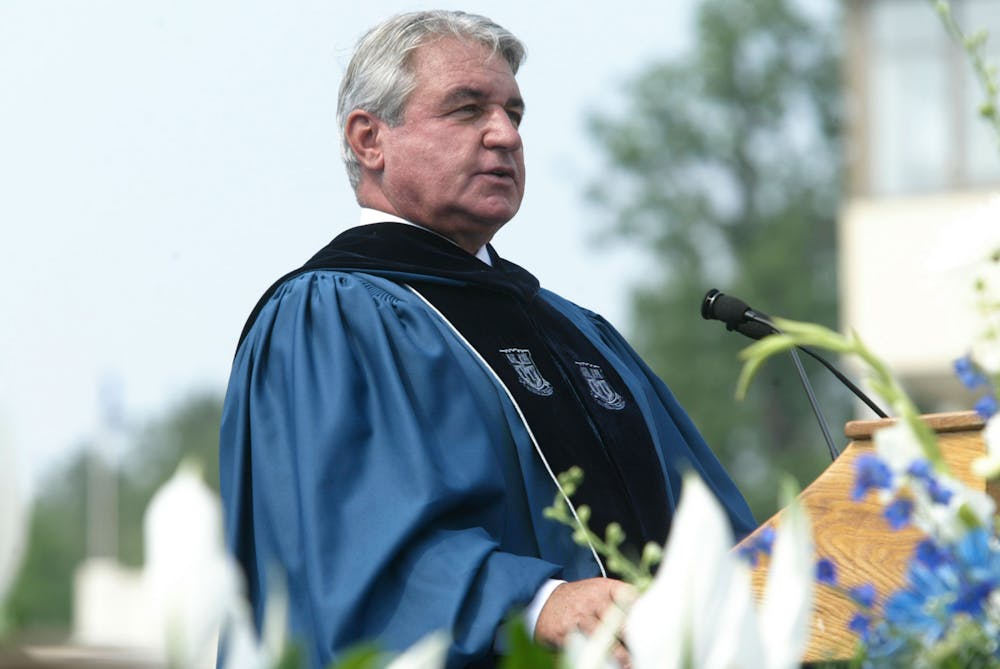Those who knew Peter Nicholas remember him being “larger than life," but it was his compassionate leadership and bold vision for Duke that made him a role model.
Nicholas, Trinity ‘64, died on May 14 at age 80 at his home in Boca Grande, Fla. He is remembered for his entrepreneurial prowess, his service to Duke’s advisory boards and his family’s major philanthropic gifts to the University. These contributions include the naming gift for the Nicholas School of the Environment and the Nicholas Institute for Environmental Policy Solutions, both of which have allowed generations of Duke students and faculty to tackle global environmental problems.
When Nicholas was a student at Duke, he studied economics and was business manager of the Chanticleer, Duke’s student yearbook. Duke is also where he met his wife Ginny Lilly, Trinity ‘64, and the two married almost immediately after graduation.
Nicholas then went on to serve two years as a junior officer in the United States Navy before resigning his commission to earn a Masters in Business Administration from the University of Pennsylvania's Wharton School. In 1979, he co-founded the Boston Scientific Corporation, a Fortune 500 company that engineers less-invasive medical equipment. He served as CEO and chairman of the company until 1999.
Tim Profeta, the founding director of the Nicholas Institute, emphasized that Nicholas successfully built Boston Scientific in a scientific field on a “new frontier.”
“He was an incredible leader. I mean, he knew how to share his vision, inspire others and drive the [company’s] strategy,” Profeta said.
Even after Nicholas' success at Boston Scientific, he and his family stayed close to Duke. Nicholas was a Board of Trustees member from 1993 to 2005, serving as chair from 2003 to 2005. From 1998 to 2002, Nicholas and Ginny served as the co-chairs for the steering committee of the Campaign for Duke, which raised $2.36 billion, one of the five largest fundraising efforts in the history of higher education at the time.
Early in the Campaign for Duke, Nicholas and Ginny gave $20 million to Duke for what became the Nicholas School of the Environment and Earth Sciences in 1995, paving the way for thousands of Duke students to engage in environmental research and policy.
Toddi Steelman, Stanback dean of the Nicholas School, applauded Nicholas' vision for investing in a “foundational element” of the University.
“He understood 30 years ago that a school like this was going to be important to the future of the world. And, you know, we have other schools that are being established now in 2022, that are doing things similar to what we've been doing for 30 years,” she said, referring to peer institutions universities like Yale, Columbia and Stanford, who have recently begun broadening their own environmental science and sustainability programs.
Steelman also remembers when she had just become dean, Nicholas and his family invited her to Boston and welcomed her “with open arms” in the fall of 2018.
“We had a really lovely dinner instead of meetings where we could just get to know each other. So it was kind of like a family welcoming,” she said.
According to Steelman, the Nicholas School has about 7,000 alumni who are all "environmental leaders of local to global consequence."
“That's the kind of scale and magnitude of change that really does have an impact, and I think that ultimately was what [Nicholas] envisioned,” she said.
Nicholas and his family also provided the naming gift for the Nicholas Institute for Environmental Policy Solutions, which was established in 2005. Profeta distinctly recalled sitting at the Hart House with Nicholas, Duke President Emeritus Richard Brodhead, and Bill Reilly, chair of the Nicholas Institute and former administrator of the U.S. Environmental Protection Agency, right after he had accepted the role. He remembered discussing the future of the Institute with them and saw it as a moment when Nicholas showed “great leadership” for Duke.
“He didn't know the intricacies of environmental policymaking processes like Bill Reilly and I did,” Profeta said. “[But] he was very, very good at understanding what others could bring to the equation and working together to design a way to execute his vision and his ambition.”
Brian Murray, current director of the Nicholas Institute for Environmental Policy Solutions and Duke University Energy Initiative, said that Nicholas gave faculty at the Institute freedom to directly engage in policy processes.
“Most of [faculty] effort is research and teaching, and not as much will be spent on this external engagement. So the idea was, rather than make all faculty members do all three things, you create an institution that could be focused heavily on one of them,” Murray said.
Though Nicholas was a risk-taking entrepreneur and a strong leader, Murray said he was still primarily a listener.
“He treated us at the Institute as if we were partners in the endeavor, not as our boss telling us what to do,” Murray said.
In addition to providing the gifts to help create the Nicholas School and Nicholas Institute, Nicholas and his family gifted the University $25 million to create the Nicholas Faculty Leadership Initiative, which matches gifts to the University for support of its faculty.
In September 2021, Nicholas was awarded the University Medal, Duke’s highest honor, for his contributions to the University. He and Ginny also won the Distinguished Alumni Award in 2007.
Murray emphasized that Ginny was essential to who Nicholas was as a person, and that she “deserves all the credit” with Nicholas for supporting the University and the Nicholas Institute.
“It's not the Peter Nicholas Institute. It's the Nicholas Institute. And it's really the whole family that has been instrumental in our success,” Murray said.
Profeta echoed Murray’s sentiments. “It should not be lost in stories that Pete and his wife, Ginny, were true partners,” he said. “Ginny was the perfect complement to Pete’s passion with her reflective and considered evaluation of their efforts.”
Ultimately, Nicholas was a “brilliant visionary strategist and a very strong driving personality” who worked to ensure the University realized his aspirations, according to Profeta.
“Nicholas had a deep love for Duke,” Profeta said. “It’s the place that gave him his opportunities coming out of undergrad. It’s the place he met his wife and fell in love. And it’s the place where he rose up to be the chairman of the board to embrace the university's outrageous ambitions and try to realize it.”
Murray sincerely appreciates the legacy that Nicholas and his family have left for the Duke community.
“He felt like he received a lot, and therefore he gave a lot in return.”
Get The Chronicle straight to your inbox
Signup for our weekly newsletter. Cancel at any time.

Katie Tan is a Trinity senior and digital strategy director of The Chronicle's 119th volume. She was previously managing editor for Volume 118.

